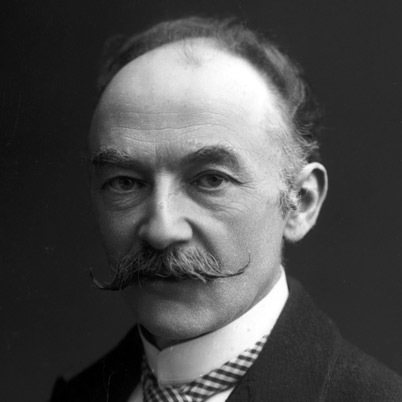Does he want you down there
In the Nether Glooms where
The hours may be a dragging load upon him,
As he hears the axle grind
Round and round
Of the great world, in the blind
Still profound
Of the night-time? He might liven at the sound
Of your string, revealing you had not forgone him.
In the gallery west the nave,
But a few yards from his grave,
Did you, tucked beneath his chin, to his bowing
Guide the homely harmony
Of the quire
Who for long years strenuously—
Son and sire—
Caught the strains that at his fingering low or higher
From your four thin threads and eff-holes came outflowing.
And, too, what merry tunes
He would bow at nights or noons
That chanced to find him bent to lute a measure,
When he made you speak his heart
As in dream,
Without book or music-chart,
On some theme
Elusive as a jack-o'-lanthorn's gleam,
And the psalm of duty shelved for trill of pleasure.
Well, you can not, alas,
The barrier overpass
That screens him in those Mournful Meads hereunder,
Where no fiddling can be heard
In the glades
Of silentness, no bird
Thrills the shades;
Where no viol is touched for songs or serenades,
No bowing wakes a congregation's wonder.
He must do without you now,
Stir you no more anyhow
To yearning concords taught you in your glory;
While, your strings a tangled wreck,
Once smart drawn,
Ten worm-wounds in your neck,
Purflings wan
With dust-hoar, here alone I sadly con
Your present dumbness, shape your olden story.
Thomas Hardy was English novelist and poet. A Victorian realist in the tradition of George Eliot, he was influenced both in his novels and in his poetry by Romanticism. While Hardy wrote poetry throughout his life and regarded himself primarily as a poet, his first collection was not published until 1898. Initially, he gained fame as the author of novels such as Far from the Madding Crowd (1874), The Mayor of Casterbridge (1886), Tess of the d'Urbervilles (1891), and Jude the Obscure (1895).




No Comments